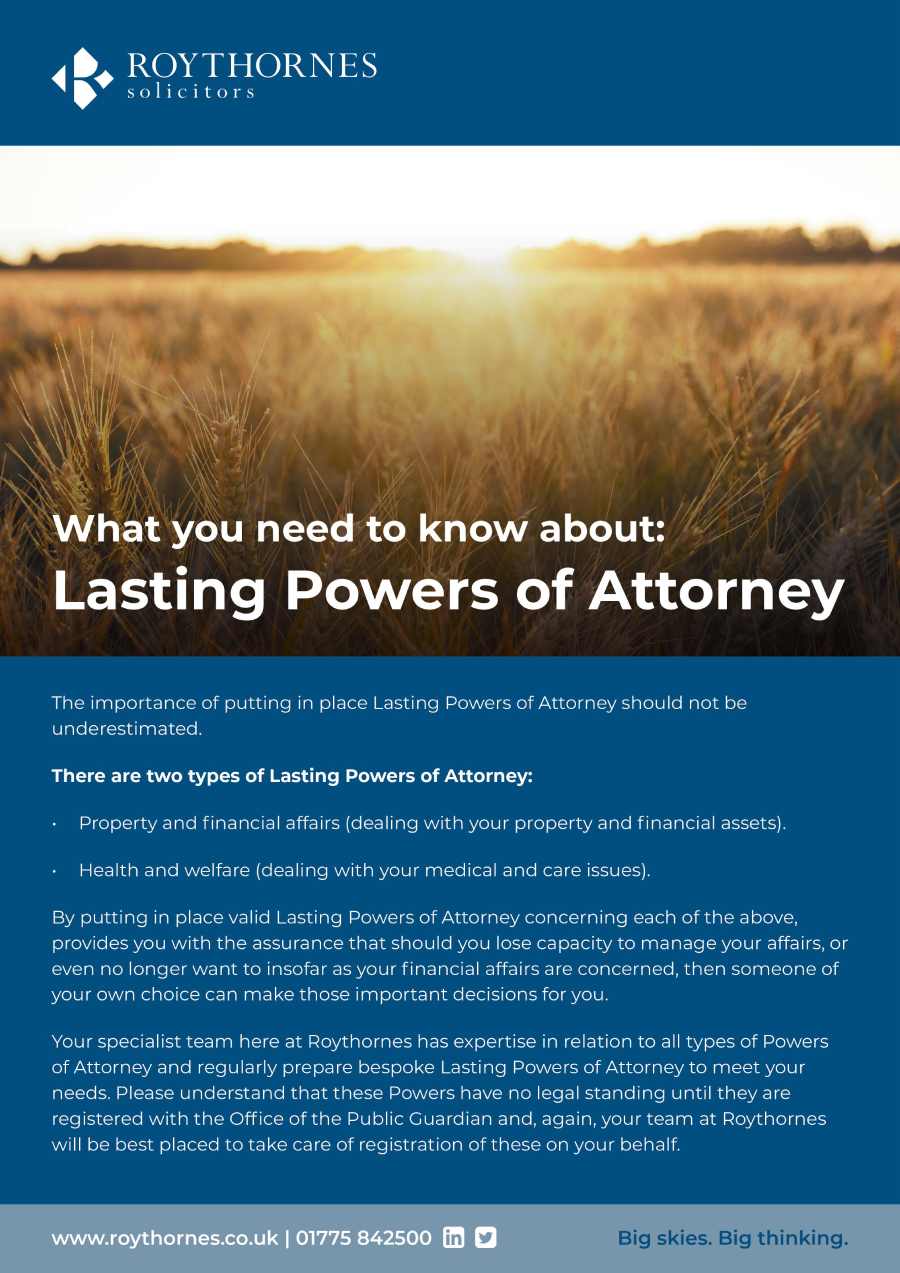When court proceedings are threatened, it can often be scary and daunting for people. This may be because of the complicated legal nature of the dispute, or because of the rules that need to be followed. In England and Wales, civil litigation is governed by...
A Power of Attorney allows you to authorise someone you trust to make decisions on your behalf about matters such as your finances, property, health and wellbeing. There are various different types of Power of Attorney you can make, depending on your needs.
Every Roythornes' client is encouraged to consider the advantages of a Power of Attorney. This may range from the pure simplicity of a general Power of Attorney in which authority can be transferred to deal with an immediate need, to the more complex and considered Enduring Power of Attorney (EPA) or Lasting Powers of Attorney (LPA).
Our team are highly experienced with advising clients on the drafting, registration and execution of Powers of Attorney, so will be happy to discuss your needs with you and help you get the appropriate documents drawn up as soon as possible.
Book an initial consultation with our power of attorney solicitors
For expert help with a power of attorney, you can arrange an initial face-to-face consultation or, alternatively, a telephone or video conference call with one of our specialist legal advisors.
To arrange your initial consultation with our specialist team, please get in touch with your local Roythornes branch in Alconbury, Birmingham, Nottingham, Peterborough or Spalding.
How we can help you with Powers of Attorney
Granting a Power of Attorney
As part of Roythornes' commitment to ensuring our clients are covered for all eventualities, we have developed a range of services empowering individuals to plan for the management of their financial affairs as well as decisions over their personal welfare in the event that they are prevented from doing so as a result of injury or illness.
Lasting Powers of Attorney (LPA)
These useful documents in their initial form were introduced on 1 October 2007. They differ from their predecessor EPA in a number of ways, including;
- There are two different LPAs giving your attorneys the ability to make specific decisions on your behalf:
- LPA for property and financial affairs
- LPA for health and welfare
- To be valid and effective, LPAs must be registered with the OPG, a process which involves checking the validity of the forms which can take several months to complete
- An additional layer of security is provided in that a Certificate Provider must validate the completion of the LPA in addition to the document being signed and witnessed as you might expect of any legal document.
We have helped thousands of clients to put in place Lasting Powers of Attorney and in most cases can offer a fixed quotation covering the cost of preparation and registration.
Once registered, should you change your mind, please contact our helpful team who can assist you in completing a deed of revocation.
Enduring Powers of Attorney (EPA)
Provided they were executed before 1 October 2007, EPAs continue to be valid and useful. Where the donor of an Enduring Power of Attorney has become or is becoming incapable of managing their affairs, there is an obligation on the attorney to register the power with the Office of the Public Guardian (OPG). Should you need any support, our team can be contacted to help you in completing this application.
Should you have an EPA, it is important to remember that this document only allows your attorney to make financial decisions on your behalf. If you wish your attorneys to make welfare decisions, you should consider completing an LPA (see below).
General Powers of Attorney
A General Power of Attorney can be used to authorise someone to manage your financial affairs temporarily or to deal with a specific matter on your behalf.
For example, you might need someone to look after your finances while you are in hospital or travelling, or it might be necessary to authorise someone else to carry out business for you abroad e.g. buying property.
Our expert team can assist you with drafting a Power of Attorney that matches your requirement, giving your attorney the exact authority they need to smoothly and effectively deal with your affairs while avoiding any risk of them overreaching their intended role.

